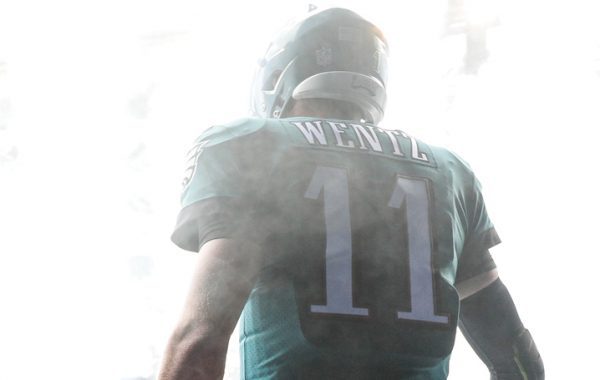Photos courtesy Philadelphia Eagles
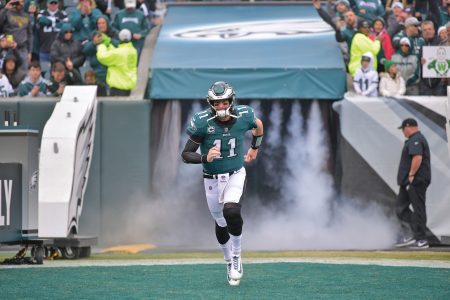
The Philadelphia Eagles lost 21-17 to the Carolina Panthers at Lincoln Financial Field on October 21, 2018 in Philadelphia, Pennsylvania. (Photo by Drew Hallowell/Philadelphia Eagles)
Carson Wentz was looking for DeSean Jackson, who was streaking down the far side line, showing off that effortless speed on a lazy summer afternoon in South Philadelphia.
Jackson slid in front of cornerback Rasul Douglas. Wentz released a long pass that settled nicely into Jackson’s white gloves. Then, without fanfare, the once and future Eagles wide receiver hit the gas and sprinted to the end zone at the team’s Novacare facility in the shadow of Lincoln Financial Field looming across the street.
The team’s public relations department quickly posted the cinematic back-to-the-future moment on social media, hoping that Eagles nation would become irrevocably giddy about Wentz and Jackson finally hooking up, foreshadowing the kind of touchdown pass that will terrorize the NFC East in 2019, and beyond.
“It was nice to see,” Head Coach Doug Pederson says.
Welcome to Carson Wentz, 2.0. Nearly every plan made, every move consummated, every penny spent has been part of a grand scheme to resurrect the franchise quarterback by taking the pressure off him, so he can take the Eagles back to the Super Bowl.
But it also has put Wentz at a crossroads – and in the crosshairs. Everything is in place for him to succeed. And when failure is not an option, the pressure’s on. Big time. Wentz is unfazed.
“When you sign up to play this game, you’re welcoming that pressure,” Wentz says. “No matter what’s happened in the past, no matter what’s expected of you in the future, there is always that pressure. For me, that’s not going to change how I prepare, how I focus, how I go out and compete every game.”
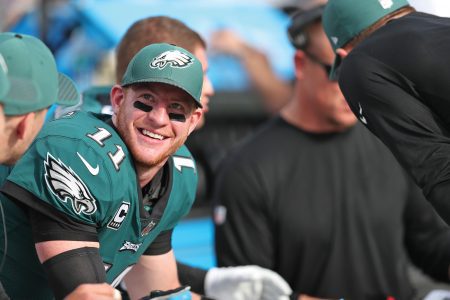 Key words there: every game. That has been his biggest problem and remains an unsettled question. Can Wentz last an entire NFL season?
Key words there: every game. That has been his biggest problem and remains an unsettled question. Can Wentz last an entire NFL season?
In 2017, when he was on track to win the NFL MVP award, Wentz suffered a devastating knee injury and Nick Foles grabbed the glory of the first Super Bowl title in franchise history. Last year, Wentz left the team in December with a cracked bone in his back and Foles nearly pulled off another miracle.
Dating back to his final collegiate season at North Dakota State in 2015, Wentz has missed 21 of a possible 68 games due to injury – that’s 31 percent, nearly one third. That’s not good, especially for a quarterback.
“That’s all, in my opinion, behind me,” Wentz says. “I don’t play the ‘what if’ game too much, and I really don’t worry about what other people think, or might say.”
And Jeffrey Lurie let his money do the talking. In June, the team rewarded Wentz with a four-year extension worth $107.9 million guaranteed – the most guaranteed money on a contract in pro football history. Wentz is the first NFL quarterback signed through the 2024 season. The team could have waited another year, waited for Wentz to finish a full season before taking the $100 million gamble. But they bet big – just like they did in the past.
The Eagles have now given out a $100 million deal to three different quarterbacks – Wentz in 2019, Michael Vick in 2011 and Donovan McNabb in 2002 – the most of any team in league history. And so far, none of those three has won a Super Bowl title. Wentz has yet to even play in a post-season game.
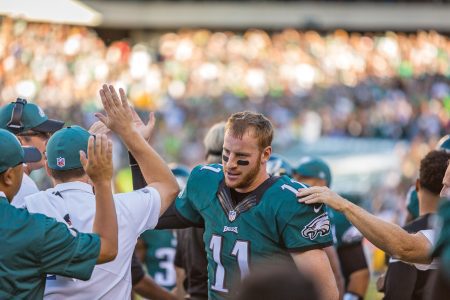 In fact, giving a $100 million deal to your quarterback does not guarantee greatness. In league history, 22 quarterbacks have signed $100 million contracts and only one has won a Super Bowl title after the big deal: Ben Roethlisberger of the Pittsburgh Steelers in 2008. Tom Brady, arguably the greatest quarterback of all time, has never signed one.
In fact, giving a $100 million deal to your quarterback does not guarantee greatness. In league history, 22 quarterbacks have signed $100 million contracts and only one has won a Super Bowl title after the big deal: Ben Roethlisberger of the Pittsburgh Steelers in 2008. Tom Brady, arguably the greatest quarterback of all time, has never signed one.
The decision to let Foles walk – the MVP of Super Bowl LII signed with the Jacksonville Jaguars – and go all-in on Wentz puts Pederson on the spot, too. And he knows it.
“I’ve said this all along that he and I came in this league together,” Pederson says. “Rookie quarterback. Rookie head coach. We’re married to this deal, too. I’m excited. Puts it behind him. He can focus on ball. We don’t have that lingering distraction into the regular season. We can just focus on football.”
But Foles’ departure is also double-edged, taking the pressure off – and putting it on. It frees Wentz from the constant reminder of what coulda, shoulda been in 2017. But St. Nick is not coming down the chimney this time to save the day. The back-up quarterback now is Nate Sudfeld. Another Wentz injury, and the season is effectively finished and the future is firmly in doubt.
So Pederson better be right. And Wentz better be ready for the tougher scrutiny. He sounded like he fully understands the situation.
“That so-called shadow or whatever you want to call it, I can’t let that bother me,” he says. “I know what I’m capable of on the field. I know what I’ve done in the past, and I know where I envision this team going. And so, I really don’t worry about what’s happened in the past – the shadow, the pressure, the stress.”
In the off-season, the team loaded up the offense to help relieve the stress on Wentz.
Start with DeSean Jackson, who made the Pro Bowl three times in his initial stint with the Eagles. He was traded back to Philadelphia in March. The last player to return for a second tenure with the Eagles after making the Pro Bowl in his first stint was, you guessed it, Nick Foles.
Good karma or not, Jackson has still got the “it” factor the Eagles offense lacked last year. His undeniable quickness and straight line speed means he demands attention in the deep part of the field – which the Eagles seemed to forget in Tampa on Sept. 16, 2018. On the first play from scrimmage that day, Jackson burned the Birds for a 75-yard touchdown bomb, setting the tone for the Eagles 27-21 loss to a team they should’ve crushed.
There has been talk that Jackson – at 32 years old – has lost a step. Forget that noise. Last year, he led the NFL with 18.9 yards per catch – the fourth time in his 11 years he’s done that. Jackson can open up the middle of the field for the Eagles two stud tight ends, Zach Ertz and Dallas Goedert.
And he will help loosen up the defense so the Eagles can run the ball more effectively with new halfback Jordan Howard, who was acquired in a trade from Chicago, where he rushed for more than 3,300 yards in his first three NFL seasons.
This is all designed to help Wentz get the Eagles offense off to a better start. In 2017, on the road to a Super Bowl, the Eagles jumped on the opposition right out of the gate. They finished second in the 32-team league in first quarter scoring and third in first half scoring. Last year, they finished the season near the bottom of the league – 31st and 27th in those categories, respectively.
As a result, the Eagles averaged just 22.9 points a game on offense – that was 18th in the league. To give that a little more perspective, Philadelphia scored just 369 points last year – that was two points less than the New York Giants, who finished last in the NFC East.
At age 26 and married, Wentz says he’s found the right balance in his life. His workout regimen and diet are more focused on flexibility, core strength and stamina. That’s worked for Brady, playing at age 42 this season and still going strong.
And this spring, once his back problem was cleared by team doctors, Wentz looked like he was in great shape, moving with that old stallion’s gait he displayed in 2017, when he got the Eagles off to an 11-2 start and threw 33 touchdown passes.
Let’s be clear about this: without those 11 wins in 2017, the Eagles do not secure home field advantage throughout the post-season. And without home field advantage, Foles’ road to the title gets a lot tougher.
When healthy, Wentz has proven to be a once-in-a-generation talent. In three years with the Eagles, Wentz already owns the franchise record for passing touchdowns in a season (33) and completion percentage in a season (69.6%). But accuracy and production are just two parts of the quarterback equation. The third and fourth: decision making and availability. That is where he must improve.
First, Wentz must take better care of his body on the field. Recklessness can no longer be tolerated by Pederson.
Go back to the injury in Los Angeles in December 2017. Remember, when Wentz decided to keep the football and dive into the end zone, it was first and goal at the two-yard line. He had three more downs to work with. He would have been better advised to throw away the football and live another day. Instead, he was met by two defenders with bad intentions, blowing out his knee.
And Wentz has to be more careful with the football. He had 13 turnovers in 11 games last year, up from 10 in 13 games in 2017. It was really the lost fumbles that plagued him. He lost six fumbles in 2018 – tied for the third most in the NFL last season. Considering he only played in 11 games, that’s not good. For a comparison, Cowboys quarterback Dak Prescott also had six lost fumbles, but he played a full 16-game season.
Turnovers were a problem for the whole team in 2018 – it’s something Pederson addressed behind closed doors on the first day of the off-season program in April.
Check this out: Last year, the Eagles had a minus six turnover margin, which was the worst among the 12 NFL teams that qualified for the post-season. The year before, when they won the Super Bowl, they were plus eleven in that category.
So Pederson and second-year offensive coordinator Mike Groh are working this summer to get Wentz to get rid of the football as quickly as he did in 2017 – maybe quicker.
One of the new critical metrics in the NFL is the time it takes from the moment the ball is snapped until the quarterback releases it – called snap to release time. The faster the better.
Brady has made an art of it. On average last year, the Patriots championship quarterback was 2.43 seconds snap to release – fastest in the NFL.
No. 2 in the league? There’s that bad man, again: Nick Foles at 2.56 seconds snap to release. That’s going to make the Jaguars much-maligned offensive line so much better. Foles gets the ball out.
Wentz’s fastest time was in 2017 – 2.67, which is pretty quick. Whittling it down to two-and-a-half seconds on a consistent basis will make all the difference in the world – keeping defenses on their heels and reducing the number of hits on Wentz. Less wear and tear on the quarterback, more production from the offense.
So, here’s a quick review: Wentz has to take care of his body. Take care of the football. Throw the long ball. And get it out quickly. A lot to ask?
Yes, of course. But to paraphrase the quarterback himself, that’s what you sign up for; stay on the field and get the job done. In short, it’s Super Bowl or bust.
“I’m excited about the future,” Wentz says. “Obviously, there has been a lot of things that have transpired over the last couple of years to get us to this moment. At the same time, we realize we have something special right now, something special for the future here. We have a talented group, and that hopefully we can do something special again.”
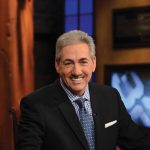 Sal Paolantonio is a national correspondent at ESPN. An updated version of his best-selling book, Philly Special: The Inside Story of How the Eagles Won Their First Super Bowl Championship, is coming out in paperback on Sept. 3.
Sal Paolantonio is a national correspondent at ESPN. An updated version of his best-selling book, Philly Special: The Inside Story of How the Eagles Won Their First Super Bowl Championship, is coming out in paperback on Sept. 3.


